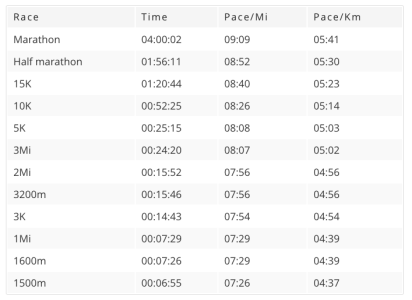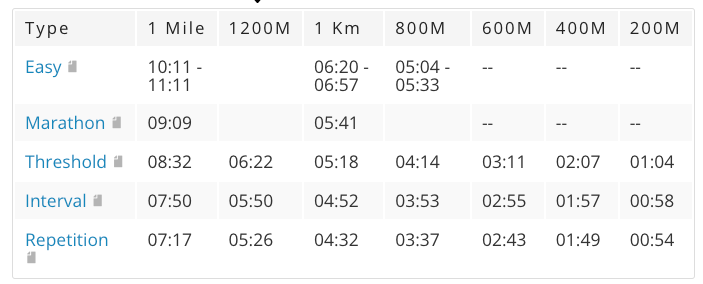I listened to the Galloway interview earlier this morning and I'm rather confused by his recommendation to run 26 miles in your training.
It's at 32:30 in the podcast if others want to find that specific question.
"Do I really need to train out to 26 miles?"
Galloway response:
Where do you want to hit the wall? He says it's well established that you'll hit the wall around 1 mile from your longest training run. If you can go 20, you can go 26 is a fallacy from other coaches. You'll get slower and slower. When a person goes from 20 mile max LR to 26 mile max LR improves by 15 min. He suggests BQ runners do 29 miles. The average improvement is 11 minutes.
***
That's about the extent of the conversation about the longest long run that I could find.
Let's use a 4:00 hour marathon runner and compare Daniels' suggestion to Galloway's suggestion. Daniels says the 4:00 hour marathon runner is capable of a 7:29 mile. So I'll be using the 7:29 mile as the Magic Mile.

Daniels suggests the following training paces:

At 150-180 minutes, this runner will max their long run at 10:11 min/mile pace for about 14.7-17.7 miles.
Now let's look at Galloway's Magic Mile data for a 7:29 mile:

The long run pace is 11:44 min/mile. That's just about 90 sec/mile slower than the pace Daniels suggests you run your long run at. So one of the reasons you are able to complete the Galloway long run of 26 miles (roughly 5 hours in this case) is because you're doing it at a much slower pace than the Daniels LR pace. That's a big key to the Galloway method and its use of the very long run. It's done at a much slower pace than other coaches recommend for the long run. Some argue that the faster long run but shorter distance is better, and others argue that the slower long run but longer distance is better. I have yet to see a conclusive research study that shows either to be better. I agree with Galloway that the much slower long run pace is more likely to keep you injury free. I'm not sure I'm on board with his idea that there isn't a "too slow" pace when it comes to the long run. It's the duration and pace combination where I'm still trying to find a line. But I do know I've had runners do the Galloway LR pace for only 180 min max and still comfortably complete the Dopey challenge without injury and in about the time we pre-predicted. They just do more mileage than the LR. And my focus is more on the totality of training than the singular long runs.
The predicted marathon time is 4:15:00. So Galloway is projecting a slower marathon finish time than the Daniels calculator. The other distances are reasonably close to each other (within a minute or so), but there's a relatively large difference in marathon projections. I'll use the real world Williams and Vickers data set for % probabilities using a HM time of 1:57 which is roughly in the middle of these two's predicted times.
-Only 2% of runners who run a 1:57 HM will run a 4:00 or better under similar conditions
-Only 37% of runners who run a 1:57 HM will run a 4:15 or better under similar conditions
So the Daniels calculator is overly ambitious in its prediction. The Galloway number is still a little above an average performance, but is more realistic.
****
As for the improvements he quotes (15 min for those doing 26 miles, and 11 min for those doing 29 miles), I'd want to see more context behind those statements. What were the runners doing prior during the rest of training? What was the pace of the 20 miler previously and the 26 miler that showed improvement? Outside of the change in LR distance, did the runners make any other changes? Was this going from a first marathon to a second marathon?
****
Moreover, I believe that Galloway stated that runners hit the wall at the longest number of miles that they run during their training.
Anecdotally, I'll provide you my experience. In the Fall of 2015, I changed from using the FIRST method, Galloway 3-day week marathon, or Galloway 3-5-day week Dopey training plan. I went with the Hansons 6-day plan. I went from multiple 20 miler training runs (albeit at a much faster LR pace than I should have been doing) during FIRST/Galloway to a peak LR of only 16 miles. I also increased my overall training load under Hansons by about double (last 13 weeks of training was 4 hrs per week increased to 7:50 hrs per week under Hansons). My average training pace comparing the two was 9:23 min/mile under FIRST/Galloway and 9:31 min/mile under Hansons. I improved my marathon PR by 42 min going from a 4:20 down to a 3:38. This wasn't merely a learned experience either. My marathons were 4:50, 4:35, 4:20, 4:27, and 4:58 under FIRST/Galloway over the course of 3 years. Hansons was my 6th marathon. Again, I peaked at 16 miles as my longest run. I did not hit the wall at 16 miles. During the second half of the marathon I set a new 10k PR. The entire second half of the marathon was only 13 seconds off my HM PR that I had only set 2 months prior on a known short course (so likely the 2nd half of the marathon was in fact a HM PR). And miles 19-21 (which are definitely after Mile 16) were only a few seconds off my then 5k PR. I did slow after Mile 21, but compared to average finish pace it was only between 0-2% (average pace was 8:21 and I did the last six miles in 7:48, 8:16, 8:14, 8:17, 8:28, and 8:27). I finished that race at an 8:21 min/mile which was far faster than my average training pace of 9:31 min/mile. That was one of my best pacing experiences even with 10 more marathons after that one. My last marathon (Nov 2022) I peaked at 17 miles (or 2:09 hrs) and ran my second fastest time of 3:15. During my 2020 Disney training I did LRs of 20.8, 21.4 and 22.8 miles and finished in 3:35.
I'm currently following Canova's marathon training philosophy for the 2022 Madison Marathon. It includes successive "waves of long runs". So the first wave of long runs will be in the beginning/middle of the training and will be at a much slower pace than I normally do them at (M Tempo is 7:02 and he has me doing them at 80% or 8:26 min/mile). I will do that up to about the duration I expect to finish in (around 3 hours or 21 miles). That'll peak with about 10-11 weeks to go until race day. As the 8:26 min/mile LR is building in my off weeks I will be building long runs at 7:44 pace and 7:23 pace at increasingly shorter durations (never more than 2 hours). So it's a little bit of fusing of the much slower but longer Galloway runs with the faster, but shorter Hansons/Daniels LRs. Canova's philosophy is to use the slower/longer training runs in the beginning/middle to enable your body physically to be able to handle the training of the faster/shorter and more specific training runs that occur in the last 10 weeks.






